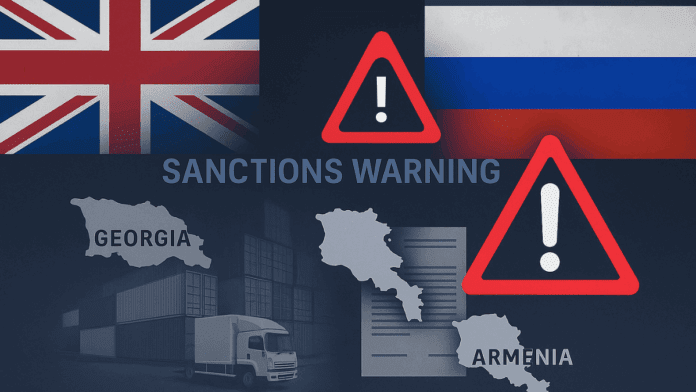UK Government Releases New Guidance for Businesses
The United Kingdom has issued a clear and urgent warning to businesses in Georgia and Armenia. The message is simple: do not help Russia avoid international sanctions. If you do, you could be sanctioned yourself.
This comes as part of the UK’s wider effort to stop Russia from getting around the tough sanctions placed after the invasion of Ukraine. The government has published a special guide on its official website. This guide explains how businesses—especially those outside the UK—might unknowingly help Russia. It also shows what can happen if they do.
The guidance is not only meant for UK companies. It is especially written for non-British businesses, including those in Georgia, Armenia, Kazakhstan, Uzbekistan, and Kyrgyzstan. The goal is to help local entrepreneurs understand what is allowed and what is not.
The British Embassy in Georgia also shared this update on Facebook, encouraging businesses to read the new guidance. The embassy highlighted that the document outlines both UK and Georgian laws that relate to sanctions.
Australia Hits Hard: Sanctions Slam 37 Russians and 7 Firms
How Businesses Could Be Helping Russia Without Realising
The guidance outlines several methods used by Russian entities to hide their real actions. These methods include:
- Using indirect delivery routes
- Faking end-user destinations
- Working with professional evasion networks
One example from the guide shows how a company in Georgia might unintentionally get involved. Imagine a Russian importer wants to buy a product that is banned under UK sanctions. Instead of buying it directly, they ask a company in Georgia to order it.
The Georgian company then places an order with a UK supplier but does not tell anyone—the supplier, the bank, the freight company—that the real buyer is in Russia. The UK company ships the product to Georgia, thinking it is a safe transaction. But then the Georgian business sends it on to Russia.
This chain of events, while it may look legal at first, is considered a way of helping Russia dodge sanctions. According to the new UK guidance, this kind of action is a serious risk.
What Happens If Businesses Break the Rules
The UK government has made it very clear: even if you are not a UK citizen or business, helping Russia can lead to serious trouble.
Kyrgyz arms dealer Sergei Zharnovnikov pleads guilty to smuggling $1.5M in U.S. weapons to Russia
Here are the key risks businesses in Georgia and Armenia need to know:
- The UK can and will sanction non-UK individuals or companies if they are found helping Russia.
- Being added to the UK sanctions list means your assets could be frozen, and you may lose access to banks and other financial services.
- Even international banks may refuse to work with you.
- If you use UK-based insurers, shipping firms, or suppliers, they will likely stop doing business with you if you are linked to sanction-breaking activity.
- UK businesses will also avoid dealing with companies that cannot prove they have effective safeguards in place to block goods from reaching Russia.
So, while local businesses may think they are just handling a regular trade, the UK sees it differently if the goods end up in Russian hands. The guidance is a strong reminder that being neutral or unaware is not enough.
The UK wants businesses to be active in checking where their goods and services are going. Not knowing the final destination is not an excuse. Every step in the chain—from order to delivery—matters.
To help, the guidance gives practical steps for companies to follow. It also explains how to spot risky deals and avoid getting caught up in sanctions evasion.
